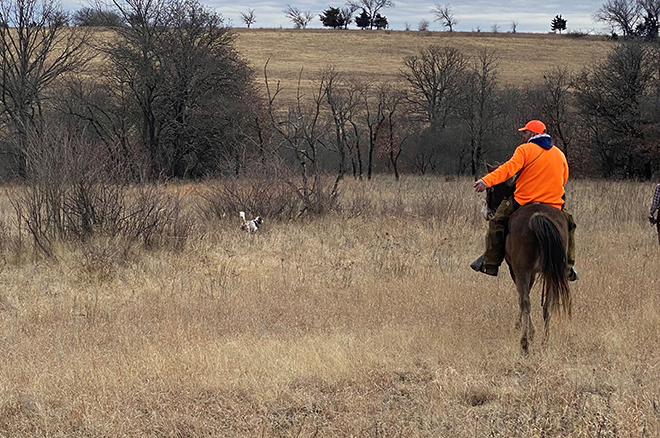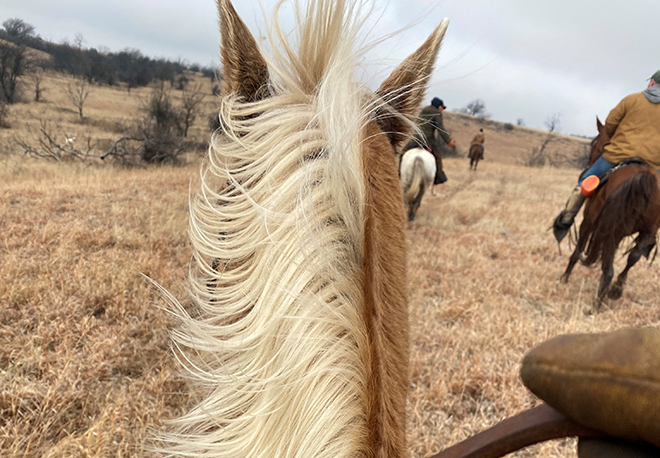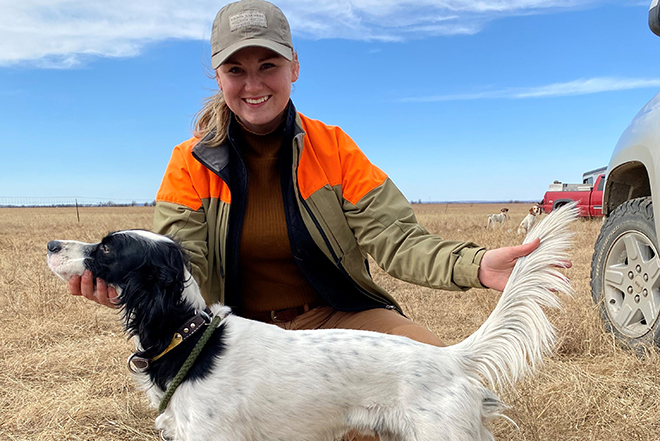Photographs by Robert Jones
By Emily Spolyar
As my young setter’s first season drifted farther and farther away in the rear-view mirror, that familiar antsy feeling that typically comes between the end of hunting season and the start of spring began to creep up on me.
The idea of entering a field trial was something I had not given much thought to, but my curiosity was steadily growing, as was the need to get outside and watch my dog work with a purpose.
Finally, I decided to reach out to some trial folks on Facebook. You know, the type of Facebook friends you don’t really know, but you both have bird dogs, so you accepted or sent the friend request anyway? I simply asked them, “ where the heck do I start?”
After taking a generous amount of time to answer all my questions, I realized there are aspects of trials that have LARGE barriers to entry. Namely, horseback trials. As the name suggests, you run your dog off a horse, which was simply not an option for me.
That left me with walking trials. As a North Dakota resident, it seems everyone in this region has forgone walking trials to focus only on horseback trials in this big, open country. Understandable, but nonetheless inconvenient for someone like me.
That left me with two options: run my dog in trials held in the grouse woods of Minnesota and Wisconsin or travel south to Kansas where there was an upcoming walking trial just south of Wichita.
I chose the latter and entered my dog into a NBHA Walking Derby put on by the Wichita Bird Dog Club.
I entered this trial as an extreme skeptic. I truthfully had to talk myself out of scratching almost every day after I entered. I have never felt the need to prove my dog’s worth, especially not to a crowd of strangers.
With that attitude, I had my guard up pulling into the trial grounds.
Maybe it’s something about the folks in Kansas, or maybe the same is true for trials across the country, but there wasn’t a single person there who didn’t give a warm welcome, offer advice, compliment my dogs, or offer to share anything I might need, including the use of their horses during the horseback trails that were also being held.

It was while sitting atop a borrowed horse, watching a gentleman in his mid-eighties run his pointer in the brace after mine, that I realized how poor and ungrateful my attitude towards these events had been. That pointer ran significantly better than my dog. But being beaten wasn’t at the forefront of my mind while watching the dog and his handler because the show they were putting on was too damn impressive to be anything but mesmerizing.
The man was quiet as his dog ate up ground at a quick, snappy pace. The pointer nailed find after find — singles, doubles, and entire coveys. Each time, the handler rode over, dismounted, and flushed the birds while his derby (a dog under 2 years old), stood fully broke through the flush and shot, both of which are not required for young dogs. While it can be easy to diminish the feat because these were pen-raised quail, the time and effort that goes into dog work that consistent is something that demands respect, regardless of where the birds came from.
I realized, with a bit of guilt, that it is only because of people like that handler, who have this bird dog game down to a science after a lifetime of experience, that I’m able to enjoy a hunting dog like mine, who has been successful purely through his natural ability, not training. This piece of humble pie was one I accepted with gratitude.
Ultimately, I learned this part of the sport isn’t so different from hunting. When it comes down to it, it’s a group of people who love dogs, birds, and other people who share that love. They come together over drinks and meals, tell stories, laugh, and everyone takes turns being the punchline of jokes that stemmed from some likely-exaggerated story in the field.

At the end of the day, I’m a wild bird hunter. That is not to say it’s any better or worse than trialers, preserve hunters, or anyone who falls in between, it’s just what I choose to do at this point in my life with the dogs and access to wild birds I currently have. After having taken part in all three, and it has undoubtedly made me a more well-rounded person, dog handler, and hunter.

As with all things in life, things could change at the drop of a hat. If I had to pick another primary focus, chasing dogs off horseback while surrounded by good people whose hard work truly does create the high standards of bird dogs that hunters like myself get to enjoy — well, that doesn’t sound like such a bad option.
This story originally appeared in the summer issue of Quail Forever Journal. If you enjoyed it and would like to read more great upland content, become a Pheasants Forever member today!
Emily Spolyar is the North Dakota Precision Ag and Conservation Specialist for Pheasants Forever and Quail Forever.